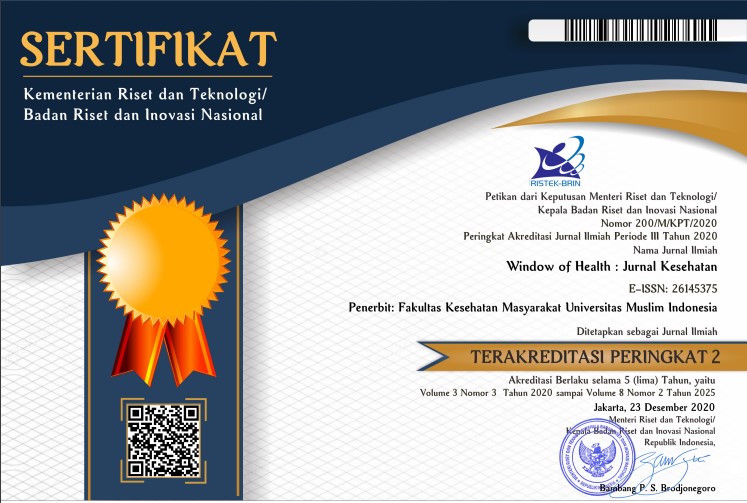Family Support for Coronary Heart Disease (CHD) Patients in Utilizing Health Information and Services
Abstract
The morbidity and mortality rate of Coronary Heart Disease (CHD) in Indonesia is increasing every year. The results of the 2019 Basic Health Research showed that 1.5% or 15 out of 1000 Indonesians suffer from CHD. The lack of health literacy of CHD patients and their families related to symptoms, risks, lifestyle, and treatment of CHD will further worsen the patient's condition. The purpose of this study was to analyze family support in coronary heart disease (CHD) patients in the use of information and health services. Qualitative research methods with a phenomenological approach and data collection techniques are used through in-depth interviews, observations, and documentation. There were eight research informants consisting of one doctor as a key informant, two supporting informants, and five ordinary informants with criteria for a patient's condition that was stable, communicative, and willing to be an informant. The results showed that the ability of patients to receive and manage information, called health literacy in CHD patients and their families, is still low because they lack the ability to receive and manage information from doctors and lack independent information search efforts. The conclusion of this study is that access to information, receipt, and management of information are very important to improve the health literacy of CHD and their families.
References
individuals with cardiovascular disease. 2017;
2. Baker DW, Parker RM, Williams M V., Clark WS, Nurss J. The relationship of patient reading ability to self-reported health and use of health services. Am J Public Health. 1997;87(6):1027–30.
3. Syah MF, Winarno RAJ, Ahya DG. Literasi Kesehatan dalam Penanggulangan Pandemik COVID-19. J AKRAB. 2020;XI(1):70–6.
4. Mayagah Kanj & Wayne Mitic. Promoting Health and Development: Closing the Implementation Gap", Nairobi, Kenya, 26-30 October 2009. Adult Learn. 2009;7(5):25–7.
5. Brørs G, Dalen H, Allore H, Deaton C, Fridlund B, Osborne RH, et al. Health Literacy and Risk Factors for Coronary Artery Disease (From the CONCARDPCI Study). Am J Cardiol. 2022;179:22–30.
6. kemkes. Penyakit Jantung Penyebab Utama Kematian, Kemenkes Perkuat Layanan Primer. Seharnegeriku.kemkes.go.id. 2022;(September):1–3.
7. Roeters Van Lennep JE, Westerveld HT, Erkelens DW, Van Der Wall EE. Risk factors for coronary heart disease: Implications of gender. Cardiovasc Res. 2002;53(3):538–49.
8. Okan O, Bauer U, Levin-Zamir D, Pinheiro P, Sørensen K. International handbook of health literacy. INTERNATIONAL HANDBOOK Research , practice and policy across the lifespan. 2019. 740 p.
9. Nutbeam DON. Health literacy as a public health goal : a challenge for contemporary health education and communication strategies into the 21st century CONTEMPORARY HEALTH. 2006;15(3):259–68.
10. Institute of Medicine. Nielsen-Bohlman L.Panzer A.Kindig D. (Ed.) Health literacy: A prescription to end confusion. Institute of Medicine. Washington, DC: National Academies Press; 2004.
11. Literacy IOMBONABHCOH. Health literacy: a prescription to end confusion. National Academies Press; 2004.
12. Triyani FA, Warsito BE. Peran Dukungan Keluarga dalam Pencegahan Kekambuhan Pasien Skizofrenia: Literatur Review. J Ilmu Keperawatan Indones. 2019;12(1):41–5.
13. Ratnasari N. Gambaran keluarga dalam memutuskan tindakan kesehatan pada keluarga dengan stroke berulang di wilayah kerja Puskesmas Ciputat Timur. 2014;
14. Berhimpong MJA, Rattu AJM, Pertiwi JM. Analisis Implementasi Aktivitas Fisik Berdasarkan Health Belief Model oleh Tenaga Kesehatan di Puskesmas. J Public Heal Community Med. 2020;1(4):54–62.
15. Vamos S, Okan O, Sentell T, Rootman I. Making a case for “education for health literacy”: An international perspective. Int J Environ Res Public Health. 2020;17(4):1–18.
16. Triana. Riza , Darwin Karim dan J. Hubungan Tingkat Pengetahuan Pasien Diabetes Mellitus Tentang Penyakit Dan Diet Dengan Kepatuhan Dalam Menjalankan Diet Diabetes Mellitus. J Online Mhs Progr Stud Ilmu Keperawatan Univ Riau [Internet]. 2015;2(1):606–11. Available from: https://www.neliti.com/publications/186118/
17. Nazmi, Rudolfo G, Restila R, Emytri. Faktor-Faktor Yang Mempengaruhi Literasi Kesehatan Di Fasilitas Pelayanan Kesehatan. Pros Semin Nas dan PKM Kesehat. 2015;1(1):303–10.
18. Rahmawati D, Rosjidi CH, Nurhidayat S. Hubungan Antara Persepsi Keluarga dengan Fast Respon Serangan Penyakit Jantung. J Vokasi Kesehat. 2018;4(2):70.
19. Riza Triana. dkk. HUBUNGAN TINGKAT PENGETAHUAN PASIEN DIABETES MELLITUS TENTANG PENYAKIT DAN DIET DENGAN KEPATUHAN DALAM MENJALANKAN DIET DIABETES MELLITUS. 2014;
20. Badwi A, Asrina A, Muhammad M. Analisis Triger Perilaku Penggunaan Napza pada Pelajar Address : Phone : bekerjasama Pusat Penelitian Kemasyarakatan dan Kebudayaan Lembaga Ilmu Pengetahuan Indonesa. 2022;5(1):79–90.
21. Legowo IA, Sarbini D. Hubungan pengetahuan pasien dan dukungan keluarga dengan motivasi pelaksanaan diet rendah garam pada pasien hipertensi di RSUD dr. Soehadi Prijonegoro Sragen. Universitas Muhammadiyah Surakarta; 2014.
22. Rosenstock IM, Strecher VJ, Becker MH. The Health Belief Model and HIV Risk Behavior Change. 1994;5–24.
23. UNESCO. Towards Information Literacy Indicators. Unesco. 2002;44.
24. Shah LC, West P, Bremmeyr K, Savoy-Moore RT. Health literacy instrument in family medicine: The “newest vital sign” ease of use and correlates. J Am Board Fam Med. 2010;23(2):195–203.
25. Santosa KS, Pratomo H. Faktor-Faktor Yang Berhubungan Dengan Tingkat Literasi Kesehatan Pasien Pelayanan Kedokteran Keluarga. PREPOTIF J Kesehat Masy. 2021;5(2):681–92.
26. Asrina A, Sudirman R. Efektivitas Penggunaan Media Video Learning Multimedia (Vlm) Terhadap Pengetahuan Infeksi Menular Seksual (Ims) (Studi Pada Waria Di Kota Makassar). J Kesehat. 2020;13(2):91.








